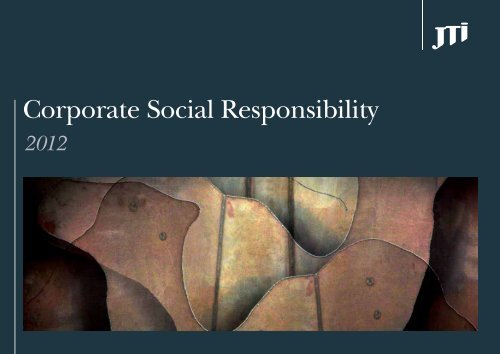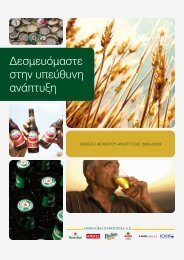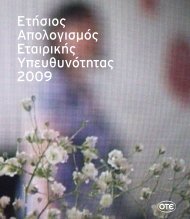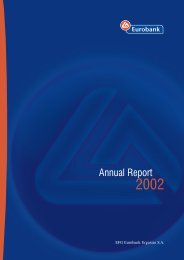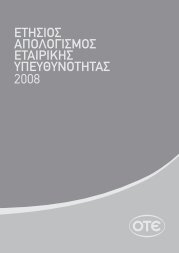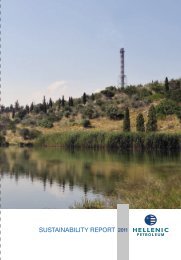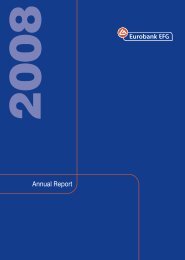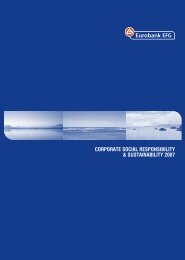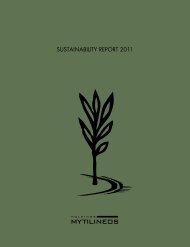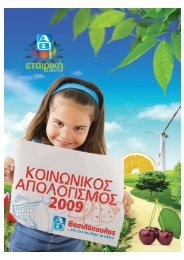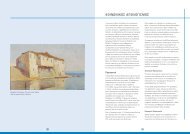Corporate Social Responsibility Report 2012 - EuroCharity
Corporate Social Responsibility Report 2012 - EuroCharity
Corporate Social Responsibility Report 2012 - EuroCharity
Create successful ePaper yourself
Turn your PDF publications into a flip-book with our unique Google optimized e-Paper software.
<strong>Corporate</strong> <strong>Social</strong> <strong>Responsibility</strong><br />
<strong>2012</strong>
Table of contents<br />
Introduction, Pierre de Labouchere................................................4<br />
Foreword, Paul Bourassa.............................................................5<br />
Organizational Governance - Governing with prudence..................6<br />
Defining standards and ethical behaviors........................................................7<br />
Human Rights - Upholding human rights.....................................8<br />
Eliminating child labor in the tobacco industry................................................9<br />
International Labor Organization agreement.................................................10<br />
Winrock International: an expert partner on the ground...............................11<br />
Labor Practices - Working as one................................................12<br />
Environment, Health and Safety at work.......................................................13<br />
Looking after each other.................................................................................14<br />
Radiation monitoring - a rapid response to disaster......................................15<br />
Environment - Respecting the environment..................................16<br />
Sustainable agriculture at the heart of Global Leaf strategy.........................17<br />
Ensuring the sustainable use of resources ...................................................18<br />
Doing our part.................................................................................................19<br />
Environmental programs that promote cleaner societies........................20-21<br />
Fair Operating Practices - Acting fairly and ethically.....................22<br />
JTI’s zero tolerance approach to illicit trade...................................................23<br />
Raising awareness of illicit trade....................................................................24<br />
Outlining our responsibilities...........................................................................25<br />
Consumer Issues - Informing our consumers............................26-27<br />
Community Involvement and Development -<br />
Giving back to society................................................................28<br />
Building businesses in South Africa’s poorest communities........................29<br />
A meaningful <strong>Corporate</strong> Philanthropy policy............................................30-31<br />
JT <strong>Corporate</strong> <strong>Social</strong> <strong>Responsibility</strong> Programs............................32-33<br />
About ISO 26000, About JTI......................................................34<br />
3
4<br />
When JTI was founded in 1999, the<br />
Company gave itself the mission not only to<br />
be successful, but also to build reputational<br />
equity and credibility by operating with<br />
integrity. Initiatives throughout our business<br />
have sprung up out of a sense of ‘doing the<br />
right thing’, recognizing the specific attributes<br />
of the manufacturing and agricultural<br />
environments we work in and the rights of<br />
the people we partner with. Over the past<br />
decade, <strong>Corporate</strong> <strong>Social</strong> <strong>Responsibility</strong> has<br />
evolved, and we are pleased to be part of a<br />
movement that promotes shared values across<br />
commercial entities, markets and regions.<br />
Striving to be the best in all that we do gives<br />
back to the societies in which we operate. It<br />
also makes good commercial sense. I believe<br />
our record speaks for itself, and in going<br />
forward, CSR will become a strategic pillar<br />
of our continued growth and success. As<br />
this report shows, by demonstrating a clear<br />
commitment to CSR we can help to change the<br />
way the world does business.<br />
Pierre de Labouchere<br />
President and CEO
<strong>Corporate</strong> <strong>Social</strong> <strong>Responsibility</strong> has come of age.<br />
For years, the practice of CSR lacked definition,<br />
if not purpose, but with the publication of the<br />
ISO 26000 guidelines in 2010, there now<br />
exists an undisputable reference for companies<br />
to benchmark their CSR activities. Over the<br />
past decade we have operated ethically as a<br />
global organization, compelled by our own<br />
understanding of what it means to act for<br />
the betterment of business, people and the<br />
environment. ISO 26000 shows that we’ve got a<br />
lot of things right, yet need to do more in certain<br />
areas. This report brings together a selection of<br />
the many initiatives across our business that<br />
align with ISO 26000. We do not claim to be<br />
perfect, but we can, and should, be proud of<br />
what we have achieved.<br />
In 2013 we will work together with our parent<br />
company to align all our CSR activities<br />
under the umbrella of the JT Group. This will<br />
deliver a unified approach to <strong>Corporate</strong> <strong>Social</strong><br />
<strong>Responsibility</strong>, enabling greater efficacy and<br />
better results across the group.<br />
Paul Bourassa<br />
Senior Vice President,<br />
Legal, Regulatory Affairs and Compliance<br />
5
6<br />
Governing<br />
with prudence<br />
JTI has in place a wide–ranging set of measures that ensure<br />
the Company’s compliance with legal and regulatory standards<br />
wherever we do business. The conduct of our employees is at<br />
the heart of what makes us an exceptional business, above and<br />
beyond recognized corporate norms.<br />
ISO 26000: ORGANIZATIONAL GOVERNANCE<br />
ISO 26000 stresses that in order for an organization to act in a socially<br />
responsible and sustainable manner, it is crucial that its decision-making<br />
capabilities, whether formal or informal, are based on processes, systems, and<br />
infrastructures that deliver good governance and accountability.<br />
Source: © International Standard ISO 26000 First Edition 2010-11-01.
Defining standards and ethical behaviors<br />
JTI’s Code of Conduct<br />
The Code of Conduct (CoC) is a set of<br />
ethical standards which JTI expects all of its<br />
employees to abide by, regardless of their role<br />
or responsibilities. It defines and encourages<br />
corporate and individual behaviors that are<br />
above reproach – both internally and through<br />
our external endeavors and dealings. The<br />
Code of Conduct explicitly describes the<br />
practices and procedures to be adhered to in<br />
relation to colleagues, suppliers, customers<br />
and society at large.<br />
The <strong>Report</strong>ing Concerns<br />
Mechanism protects employees’<br />
confidentiality<br />
The <strong>Report</strong>ing Concerns Mechanism (RCM)<br />
oers a means of reporting activities that an<br />
individual suspects may be in breach of the<br />
law, or contravene JTI’s Code of Conduct<br />
or Policies & Procedures. The RCM allows<br />
an employee to raise an issue via an online<br />
form or directly to a “Contact Person”<br />
based in his or her operation. There are 200<br />
Contact Persons worldwide, trained to listen<br />
to and report allegations. Those cases are<br />
then reported to <strong>Corporate</strong> Compliance in<br />
Geneva, which analyzes and, if appropriate,<br />
recommends an investigation into the<br />
allegation by the Global Investigation Team.<br />
At all times the reporting employee’s identity<br />
is kept confidential, unless it is required to<br />
be revealed according to local legislation (for<br />
example, in criminal cases or incidences of<br />
sexual harassment).<br />
Operating Guidelines and<br />
Policies & Procedures facilitate<br />
and govern the strategic decision<br />
making process within JTI<br />
JTI’s Operating Guidelines and Policies<br />
& Procedures are key elements of the<br />
Company’s <strong>Corporate</strong> Governance<br />
framework. Applicable to all operations<br />
and employees worldwide, the Operating<br />
Guidelines drive JTI’s strategic decisionmaking<br />
process, outlining the delegation of<br />
authority and the requirements for seeking<br />
approval of key business decisions by the JTI<br />
and JT Executive Committees.<br />
JTI’s Policies & Procedures define the<br />
Company’s processes, operating practices<br />
and responsibilities, and establish a<br />
framework for internal controls.<br />
JSOX focuses on Internal<br />
Controls over Financial<br />
<strong>Report</strong>ing across the organization<br />
As a company publicly listed on the Tokyo<br />
Stock Exchange, JT and its subsidiaries,<br />
including JTI, are obliged to comply with<br />
JSOX; a Japanese law which requires<br />
management to evaluate the eectiveness<br />
of internal controls over financial reporting.<br />
External auditors are required to audit the<br />
internal controls evaluation by management,<br />
and significant control weaknesses must be<br />
disclosed in public filings.<br />
Product Stewardship<br />
JTI’s Product Stewardship program ensures<br />
that ingredients used in the manufacture<br />
of its products do not increase the inherent<br />
health risks associated with tobacco use.<br />
The program is based on the practices<br />
of regulatory bodies and professional<br />
organizations specialized in risk assessment.<br />
JTI also adheres to tobacco product<br />
ingredients regulation in the markets in which<br />
we operate.<br />
7
Upholding<br />
human rights<br />
JTI’s goal is to ensure that human rights are respected in all<br />
areas of its business and across all of its dierent working<br />
environments. We strive to ensure that no employee is subject<br />
to discrimination or exploitation, and to ensure that all<br />
employees are treated fairly. JTI expects and encourages its<br />
business partners everywhere to adopt this same goal.<br />
ISO 26000: HUMAN RIGHTS<br />
ISO 26000 promotes the idea that organizations<br />
should actively support and respect Human Rights as<br />
recognized standards, regarding the sanctity of life, as<br />
well as political, social and economic rights.<br />
Source: © International Standard ISO 26000 First Edition 2010-11-01.<br />
8
Eliminating child labor in the tobacco industry<br />
Tackling the causes and eects:<br />
eliminating child labor<br />
JTI takes the issue of child labor very seriously, and<br />
contributes to eradicating child labor in tobacco<br />
farming both through its own initiatives and in<br />
collaboration with other organizations.<br />
We work to improve the livelihoods of farmers<br />
and communities where children have historically<br />
worked alongside adults by raising awareness<br />
of the detrimental eects of child labor. JTI<br />
also encourages and supports the creation of<br />
educational opportunities for children, and supports<br />
Governments, Non–Governmental Organizations<br />
(NGOs) and International Organizations (IOs) to help<br />
improve national legal and regulatory frameworks<br />
to eectively address child labor.<br />
JTI is a member of the ‘Eliminating Child<br />
Labor in Tobacco Foundation’ (ECLT), a multi–<br />
stakeholder partnership of trade unions, growers<br />
and companies with the International Labor<br />
Organization (ILO) as its advisor. The ECLT’s aim is<br />
to eliminate the use of child labor in the<br />
tobacco industry.<br />
Specific Code of Conduct<br />
guidelines on child labor<br />
JTI recognizes that certain types of work performed<br />
in tobacco growing, harvesting, processing and<br />
manufacturing, and the circumstances in which<br />
such work is carried out, may harm a child’s safety,<br />
health or moral rights, and must not be performed<br />
by children under the age of 18 years.<br />
Children between the ages of 16 and 18 may<br />
engage in such work if permitted by local law, if<br />
their health, safety and morals are fully protected,<br />
and if they have received adequate specific training<br />
to perform these tasks. JTI’s child labor policy<br />
has used as reference the ILO Convention No.138<br />
(Minimum Age Convention 1973) and Convention<br />
No.182 (Worst Forms of Child Labor<br />
Convention 1999).<br />
Our eorts to eradicate child labor in tobacco<br />
farming focus on the implementation of specifically<br />
targeted programs and projects in those areas<br />
where JTI does business and has influence, in<br />
collaboration with Governments, IOs, NGOs,<br />
employers’ and workers’ organizations, the private<br />
sector and local communities.<br />
ARISE (Achieving Reduction of Child Labor in Support<br />
of Education)<br />
JTI’s flagship program aimed at eliminating<br />
child labor in tobacco farming is ARISE, which<br />
was developed in 2011 and launched in<br />
early <strong>2012</strong>.<br />
JTI’s ARISE program supports tobacco<br />
growing communities, notably in Brazil and<br />
Malawi. The goals of this program are to<br />
remove children from child labor, promote<br />
access to quality education for these children<br />
and, importantly, to create sustainable<br />
alternatives for farmers so that they no longer<br />
need to employ children.<br />
ARISE provides educational materials<br />
and after–school tutoring that serve as<br />
enhancements to formal schooling. It oers<br />
mentoring and access to technical and<br />
vocational training for older children via Model<br />
Farm Schools and professional skills courses.<br />
Family Support Scholarships also provide<br />
entrepreneurship training and conditional<br />
capital investments for parents or guardians<br />
to help remove their children from child labor<br />
and to ensure that they stay in school.<br />
ARISE contributes to broader child labor<br />
elimination schemes that are run on a national<br />
level in education, social protection, and rural<br />
development. By linking ARISE with national<br />
stakeholders, JTI’s program helps to create<br />
change at the community level which can be<br />
sustained over the long–term.<br />
ARISE was developed together with Winrock<br />
International and the ILO. In addition to<br />
actively participating in the design and<br />
execution of the program, ARISE is also<br />
wholly funded by JTI. This is the first time<br />
the ILO has partnered with a tobacco<br />
manufacturer in an eort to eliminate child<br />
labor in tobacco farming.<br />
9
International Labor<br />
Organization Agreement<br />
10<br />
“The strategic partnership between JTI, Winrock and the ILO<br />
perfectly demonstrates how the close cooperation of government,<br />
the private sector, labor organizations and the international<br />
community can contribute to the prevention and elimination of<br />
child labor through the development of education opportunities.”<br />
RENATO MENDES<br />
NATIONAL COORDINATOR – ILO –<br />
INTERNATIONAL PROGRAMME ON THE ELIMINATION OF CHILD LABOUR<br />
The ILO recognizes that the private sector<br />
can drive major innovations in the world of<br />
work, and actively seeks partners in private<br />
enterprise in order to exchange experience<br />
and promote decent work throughout the<br />
business world.<br />
The ILO works with individual companies<br />
and foundations to tackle important global<br />
labor market issues and support sustainable<br />
enterprises and entrepreneurs.<br />
The ILO and company partnerships can take<br />
many forms and bring numerous advantages<br />
that help benefit this shared cause. The ILO/<br />
JTI partnership to help eliminate child labor in<br />
tobacco farming includes the exchange<br />
of knowledge and expertise, advocacy and<br />
awareness–raising campaigns, organization<br />
of meetings and events and collaborative<br />
research projects.<br />
The ILO brings its deep knowledge of child<br />
labor regulations and challenges to this<br />
important issue.<br />
For more information,<br />
please visit www.ilo.org.
Winrock International<br />
an expert partner on the ground<br />
Winrock International is a non–profit<br />
organization that works with people around<br />
the world to empower the disadvantaged,<br />
increase economic opportunity, and sustain<br />
natural resources. JTI chose Winrock<br />
International to help implement the ARISE<br />
program on the ground because of their<br />
extensive experience in tackling child labor in<br />
the agriculture sector.<br />
Winrock understands the challenging socio–<br />
economic factors influencing child labor<br />
incidence, particularly in rural areas, where a<br />
high rate of child labor is an indicator of weak<br />
economic systems and is linked to low levels<br />
of rural development. JTI shares Winrock’s<br />
belief that ‘child labor is problematic because<br />
it perpetuates an unskilled labor force;<br />
children grow up untrained and uneducated,<br />
thus continuing a vicious cycle of poverty’.<br />
The Winrock partnership is an integral<br />
part of the ARISE initiative. By leveraging<br />
Winrock’s extensive expertise, JTI can<br />
help create alternative approaches to aid<br />
the elimination of child labor, increase<br />
educational opportunities for children and<br />
raise awareness in communities.<br />
“The partnership among JTI, ILO –<br />
IPEC and Winrock oers an eective<br />
tri – sector approach to eliminating<br />
child labor. We believe that through<br />
this integrated program, which<br />
includes improving education and<br />
livelihoods, the gains made will<br />
be sustained and JTI can lay the<br />
groundwork for child labor free<br />
zones. While we are in the early stages<br />
of implementation, we are optimistic<br />
about the potential of<br />
this partnership.”<br />
CAROL MICHAELS O’LAUGHLIN<br />
GROUP VICE PRESIDENT, EMPOWERMENT & CIVIC ENGAGEMENT<br />
AT WINROCK INTERNATIONAL<br />
11
12<br />
Working as one<br />
It is JTI’s duty to provide optimal working conditions that meet<br />
stringent environment, health and safety (EHS) standards.<br />
We exceed the minimum national EHS requirements in the<br />
countries in which we operate, helping employees to not only<br />
work eciently and productively, but to thrive.<br />
ISO 26000: LABOR PRACTICES<br />
Labor practices of an organization encompass all policies and practices relating<br />
to work performed within or on behalf of an organization. These include socially<br />
responsible policies, decent conditions of work and provisions for health and safety<br />
at workplaces that the organization owns or directly controls.<br />
Source: © International Standard ISO 26000 First Edition 2010-11-01.
Environment, Health<br />
and Safety (EHS) at work<br />
DAVID DOOLEY, VICE PRESIDENT, EHS<br />
EHS and Risk Assessment<br />
Training for manufacturing<br />
newcomers<br />
The ‘Basics of EHS and Risk Assessment’ is<br />
a five–day program for all those entering into<br />
the field of EHS, as well as any employee<br />
who needs to increase EHS knowledge and/<br />
or enhance risk assessment skills.<br />
During the course, participants learn about<br />
EHS principles, policies and standards and<br />
are taught the full range of EHS risks inherent<br />
to JTI’s operations. Equipped with this<br />
knowledge, sta can go on to deliver eective<br />
risk assessment – a first step to reducing and<br />
controlling EHS risk. Currently the course<br />
is available for sta at JTI factories, Global<br />
Supply Chain and Global Leaf operations;<br />
the Company is set to roll out the program to<br />
encompass markets from 2013 onwards.<br />
A user-friendly EHS self-<br />
assessment tool<br />
With JTI’s simple EHS assessment tool,<br />
factory managers can evaluate the full range<br />
of EHS activities on their site, rating their EHS<br />
performance from 1-to-5. All the leading EHS<br />
indicators are mapped across the four key<br />
areas of EHS: Environment, Occupational<br />
Health, Safety and Management Systems.<br />
As data is not shared across plants,<br />
managers concentrate on their performance<br />
“Since the EHS Excellence Awards were<br />
launched in 2005, the number of projects<br />
submitted has grown steadily, rising from<br />
39 in its inauguration year to 154 in <strong>2012</strong>.<br />
This represents the expanding scope and<br />
importance of the company’s EHS initiatives.”<br />
and are asked to consider the specificities of<br />
their own site. This empowers them to act on<br />
any weaknesses and make remedial plans.<br />
The tool supports continuous improvement<br />
in EHS standards, promotes increased<br />
knowledge and understanding of EHS topics<br />
and generates a transparent and accurate<br />
picture of EHS performance and eciency.<br />
For more information on our Environment,<br />
Health & Safety performance and programs,<br />
please see JTI’s EHS Annual <strong>Report</strong> on<br />
www.jti.com.<br />
EHS Excellence Awards<br />
JTI’s annual EHS Excellence Awards are<br />
open to all company employees. The Awards<br />
aim to promote excellence in any area of JTI<br />
activity that may touch upon Environment,<br />
Occupational Health, Occupational Safety<br />
or Teamwork, and provide employees with<br />
a framework in which to generate change<br />
and improvements in the way they work.<br />
They have helped to generate a diverse range<br />
of novel tools and processes that are then<br />
shared within the Company.<br />
13
Looking<br />
after each other<br />
In addition to ensuring safe places of work and abiding by stringent<br />
occupational health and safety standards, JTI seeks to ensure that<br />
employees’ general wellbeing is addressed.<br />
Wellness in the workplace<br />
JTI operates a range of workplace wellness<br />
programs, at sites ranging from oces to<br />
processing plants. In Canada, a ‘Lunch and<br />
Learn’ initiative covers health–related topics<br />
such as oce ergonomics, and employees<br />
can receive health services such as check–<br />
ups and massages. Results help to prevent<br />
14<br />
absence, improve health and even detect<br />
disease. At a JTI leaf–processing factory in<br />
Brazil, ‘Labor Gymnastics’ helps prevent risks<br />
from repetitive tasks. Results have greatly<br />
reduced referrals to the company doctor.<br />
Creating safety leadership at JTI<br />
EHS at JTI is about promoting behavioral<br />
change and embedding a culture of safety.<br />
JTI’s Safety Change Program focuses heavily<br />
on behavior and aims to turn managers and<br />
supervisors into safety leaders through a<br />
‘Safety Leadership Course.’ This is tailored<br />
to suit employees’ working environments,<br />
picking up tried–and–tested principles<br />
from JTI’s broader safety programs and<br />
complementing existing EHS standards and<br />
principles in these workplaces. After a two–<br />
day session, managers implement a three –<br />
step, on–going safety program. This includes<br />
positive reinforcement through ‘Safety<br />
Dialogues’, employee–driven ‘AECT’ (Actions<br />
Employees Can Take), and establishing ‘Task<br />
Teams’ to design and implement<br />
safety programs.<br />
JTI’s Alert Driving program<br />
Every day, 8,000 JTI employees drive a car<br />
for company business, so it is essential<br />
for the Company to continuously provide<br />
safety guidance. The ‘Alert Driving’ program<br />
is a web–based, localized driver training<br />
tool, which began roll–out in 2011. The<br />
interactive program consists of 12 modules,<br />
including speeding, distractions, parking<br />
and maneuvers, what to do at junctions and<br />
how best to avoid collisions. Employees in all<br />
divisions, whether they drive as part of their<br />
work or not, are invited to participate. During<br />
the next three years, all employees across the<br />
world will be able to join the program and<br />
invite a family member to participate.
Radiation monitoring<br />
a rapid response to disaster<br />
As the international arm of Japan Tobacco<br />
Inc., the entire Company was concerned<br />
when Japan was struck by a devastating<br />
earthquake and the ensuing nuclear disaster<br />
on 11 March 2011. The damaged Fukushima<br />
nuclear reactor on Japan’s east coast was<br />
not close to any of JT’s operating plants.<br />
However, both JT and JTI wanted to act<br />
out of an abundance of caution to ensure<br />
that any materials shipments from Japan<br />
– which JTI frequently receives – were not<br />
contaminated by radioactivity.<br />
JTI rigorously analyzed potential levels of<br />
radiation to help reassure customers and<br />
employees that imports carried no risk. A<br />
testing protocol was developed with support<br />
from radiation experts at Environmental<br />
Resources Management (ERM), the world’s<br />
largest environmental consulting company.<br />
The protocol was applied across the<br />
company and highly sophisticated radiation<br />
contamination monitors were purchased and<br />
distributed to all factories around the world.<br />
The equipment enabled all raw materials<br />
entering factories from Japan to be checked;<br />
materials and finished goods were also<br />
monitored before leaving Japan. During a<br />
six–month period following the disaster, over<br />
7,000 individual tests were performed, with<br />
no evidence of contamination.<br />
After collecting JTI’s radiation data, ERM<br />
subjected this information to various<br />
statistical analyses developed by the US<br />
Environmental Protection Agency. The results<br />
showed no evidence of contamination<br />
resulting from the events at Fukushima.<br />
Based on this assessment, in September<br />
2011, testing of raw materials at JTI factories<br />
was suspended.<br />
In December 2011, upon the advice of ERM,<br />
radiation–monitoring operations in Japan<br />
were stopped. JTI will continue to monitor the<br />
situation in Japan, and has retained ERM to<br />
undertake this eort.<br />
15
16<br />
Respecting<br />
the environment<br />
Protecting the environment is one of society’s pressing concerns, and as an<br />
agro–manufacturer, we are keen to apply good environmental practices. JTI’s<br />
goal is to both minimize its impact on the communities where the Company<br />
operates, and to optimize eciency to ensure that we operate in a sustainable<br />
and ecient manner over the long–term.<br />
ISO 26000: ENVIRONMENT<br />
In order to improve environmental performance, ISO 26000 recommends that<br />
organizations review their environmental impacts on a global scale. This can<br />
be achieved by adopting sustainable procurement and environmental risk<br />
management strategies, and through implementing clean technologies and<br />
ecologically ecient initiatives.<br />
Source: © International Standard ISO 26000 First Edition 2010-11-01.
Sustainable<br />
Agriculture<br />
at the heart of<br />
Global Leaf<br />
strategy<br />
In 2010, JTI began the process of enhancing<br />
its strategy for Sustainable Agriculture. The<br />
move was deemed essential to secure a<br />
long–term supply of tobacco by working to<br />
raise farmer incomes, reducing environmental<br />
impacts and improving the social well-being<br />
of the farming communities where the<br />
Company is present. In simple terms, by<br />
helping to create a better future for tobacco<br />
farmers, we will also ensure the continued<br />
supply of high quality products to our<br />
customers. The newly enhanced framework<br />
for achieving JTI’s vision of a sustainable leaf<br />
supply chain was completed in 2011, with<br />
several key initiatives already in place today.<br />
These include initiatives to assist in the<br />
eradication of Child Labor, programs to<br />
promote responsible forestry management<br />
and the deployment of Good Agricultural<br />
Practices (GAP) to improve farmer profitability<br />
and to promote safe working conditions<br />
for farm laborers. GAP promotes good<br />
agronomic standards with three key<br />
objectives: productivity, usability (quality)<br />
and integrity.<br />
However, the attainment of the<br />
aforementioned vision is also dependent<br />
on the development of several other key<br />
initiatives that will be implemented and<br />
reported in the medium–term.<br />
17
Ensuring<br />
the sustainable<br />
use of resources<br />
Forestation and reforestation<br />
maintain wood reserves<br />
Tobacco production often requires wood as<br />
a fuel source for curing tobacco leaf. JTI is<br />
keen to minimize the environmental impact<br />
of its tobacco–related activity, which is why<br />
as part of its Good Agricultural Practices<br />
(GAP), the Company engages in forestry<br />
activities, planting trees as a crop (Forestation)<br />
and replenishing previously depleted forest<br />
reserves (Reforestation).<br />
18<br />
Forestation aims to ensure that JTI’s<br />
contracted tobacco growers have access to<br />
a reliable and sustainable supply of wood<br />
fuel. JTI currently develops and manages<br />
forestation programs in tobacco-producing<br />
areas in Brazil, Zimbabwe, Malawi, Tanzania,<br />
and Zambia. Tree seedlings are planted in<br />
line with planned future leaf production and<br />
curing requirements. Forestation management<br />
guarantees the supply of sustainable wood<br />
fuel sources and ensures compliance with<br />
local requirements related to the exploitation<br />
and supply of firewood from forestry<br />
resources. This includes providing technical<br />
training for local farmers as well as increasing<br />
awareness of the principles of<br />
sustainable agriculture.<br />
Reforestation is a systematic program<br />
of re–planting trees in an area where the<br />
forestry reserves have been depleted. JTI,<br />
in collaboration with specialized institutions<br />
such as Washington State University and their<br />
locally appointed NGOs in the Philippines,<br />
Malawi, Tanzania and Zambia, has a range<br />
of projects that seek to remedy this issue. JTI<br />
and JT began funding reforestation programs<br />
in these areas in 1996, and continue to do<br />
so today. To date, JTI–funded reforestation<br />
programs have replanted approximately 20<br />
million trees.
Doing our part<br />
Group Certification EHS<br />
All JTI manufacturing operations are<br />
assessed and certified to a strict set of<br />
internationally recognized standards.<br />
These include ISO certification for JTI’s<br />
environmental management and OHSAS<br />
(Occupational Health and Safety Advisory<br />
Services) certification for JTI’s management<br />
of occupational health and safety issues.<br />
To ensure consistency of standards<br />
company–wide, JTI works with ERM CVS,<br />
an external auditor that ensures a consistent<br />
Greenhouse Gas Management<br />
JTI actively strives to reduce and track direct<br />
carbon emissions, commonly known as<br />
‘greenhouse gases’ from all of its business<br />
areas, including manufacturing, emissions<br />
generated from oces (such as electricity,<br />
heat and light), and fuel from its fleet and<br />
business travel. We then aggregate this<br />
energy consumption into a carbon emissions<br />
equivalent; the Company can act upon this<br />
information and make targeted changes,<br />
which may include reducing energy<br />
assessment approach encompassing top–<br />
level issues such as performance results and<br />
processes as well as more detailed items that<br />
include documentation and data inputs.<br />
JTI undergoes an annual EHS assessment<br />
and an external audit. Following a successful<br />
assessment, the Company is awarded EHS<br />
certification, which lasts three years, yet<br />
which can be revoked at any time.<br />
consumption, fuel switching or changing to<br />
‘green’ energy supplies.<br />
JTI’s focus for <strong>2012</strong> expands on these<br />
initiatives to assess the Company’s indirect<br />
carbon emissions, namely those created<br />
within our broader supply chain. During the<br />
year, JTI conducts analysis, identifying areas<br />
of opportunity, and developing mid– and<br />
long–term targets before implementing<br />
programs to achieve these goals.<br />
“The aim of Group Certification<br />
is a safer environment with<br />
minimized EHS risk. Our yearly<br />
assessment supports our objective<br />
of continuous improvement across<br />
the board.”<br />
JIM HOWARD, ENVIRONMENT DIRECTOR, EHS<br />
“EHS doesn’t belong to EHS<br />
specialists, it belongs to everyone.<br />
Our job is to try and help everyone<br />
achieve the best they can. We<br />
provide the tools, we coach, advise,<br />
support, encourage and motivate,<br />
but real change comes from our<br />
people.”<br />
DAVID DOOLEY, VICE PRESIDENT, EHS<br />
19
Environmental programs<br />
promote cleaner societies<br />
JTI’s Clean Beaches campaigns<br />
in Greece and Cyprus<br />
JTI’s Clean Beaches campaigns help to<br />
protect marine environments from cigarette<br />
waste by encouraging adult smokers towards<br />
responsible cigarette disposal on beaches.<br />
JTI’s campaigns in Greece and Cyprus<br />
are implemented in cooperation with two<br />
NGO partners: HELMEPA (Hellenic Marine<br />
Environment Protection Association) and<br />
CYMEPA (Cyprus Environment Protection<br />
Association). The programs communicate<br />
with adult consumers at the countries’ two<br />
largest and most popular beaches. Leaflets<br />
and portable beach ashtrays are given to<br />
20<br />
adult smokers, advising them to use these,<br />
rather than stubbing out cigarettes in the<br />
sand. JTI employees and key business<br />
partners have also taken part in annual<br />
voluntary beach ‘clean–ups’.<br />
Empowering consumers in Italy<br />
with over three million ashtrays<br />
In Milan, in 2007 and 2008, JTI collaborated<br />
with the Milanese waste collection company<br />
AMSA, helping to distribute 70,000 portable<br />
ashtrays and to produce 5,000 outdoor<br />
ashtrays, strategically placed outside bars<br />
and tobacconists. Other similar collaborations<br />
have taken place since then, including<br />
partnerships with Sciare, Panorama and<br />
Sette magazines, as well as with Marevivo,<br />
a marine protection association. By the end<br />
of 2011, through these and other initiatives,<br />
JTI had distributed over three million portable<br />
ashtrays throughout Italy.<br />
Keeping Sweden Tidy: two<br />
initiatives to keep cities clear of<br />
cigarette butts<br />
In 2010, Stockholm was elected European<br />
Environmental Capital. At the same time,<br />
several studies showed that the main source<br />
of litter in the city was cigarette butts. JTI<br />
supported the ‘Keep Sweden Tidy’ campaign<br />
by jointly donating a cigarette vacuum<br />
cleaner to the city of Stockholm, together<br />
with British American Tobacco (BAT) and<br />
Philip Morris International (PMI). JTI also<br />
funded an advertising campaign for the<br />
Swedish Association of Local Authorities and<br />
Regions, under the theme: ‘Feel Like [you are]<br />
at Home’. Advertisements illustrated cigarette<br />
butts on a living room floor, with the caption:<br />
“The city is an extension of your living room.<br />
Please use an ashtray when you are out. It<br />
makes things a little nicer, just like at home”.
Reducing water consumption in<br />
Montreal, Canada<br />
In Montreal, JTI has a production plant of<br />
approximately 58,000m 2 , which in 2004<br />
consumed 202,400m 3 of water. As one of its<br />
main EHS projects for 2005, the Company<br />
set itself the challenge of reducing this by<br />
25% with an additional reduction of 10% in<br />
2006. The air conditioning (A/C) units and<br />
the vacuum pumps were identified as the<br />
equipment that consumed the most water.<br />
The first area of attention were the water–<br />
cooled A/C units. The plant has 19 units and<br />
only one needs to run around the clock. To<br />
control these more eciently, timers were<br />
installed to reduce running time from 8760<br />
hours per year to an average of 2000 hours.<br />
The second project focused on reducing<br />
water consumption for the vacuum pumps<br />
used in cigarette manufacturing. The solution<br />
was to introduce a ‘closed loop’ system<br />
instead of releasing water into the drains.<br />
With these two major initiatives, and<br />
additional projects, JTI reduced water usage<br />
by 34% in 2005 alone. Further reductions<br />
were made in 2006, as per the<br />
original challenge.<br />
Boxing clever: re-using waste cardboard containers in Serbia<br />
At JTI’s Senta Factory in Serbia, tobacco was<br />
previously packed, transported and stored in<br />
hessian cloths tied with string, which often<br />
led to the loss of tobacco leaf, and the risk of<br />
contamination. To eliminate these problems<br />
it was decided to change the way tobacco<br />
was packed, opting to re–use large cardboard<br />
containers, known as C48s, which were<br />
usually thrown out as waste after single use.<br />
Other than the financial savings that have<br />
been identified, benefits also include better<br />
quality tobacco, the elimination of spillage<br />
across the entire handling cycle, improved<br />
cleanliness at the processing lines and an<br />
increase in receiving capacity. Furthermore,<br />
the boxes can be reused several times over.<br />
21
Acting fairly and ethically<br />
22<br />
Responsible business practice is a core JTI priority. We act to<br />
ensure that our business is conducted in a fair and ethical<br />
manner everywhere by requiring all employees to adhere to<br />
the JTI Code of Conduct at all times. We apply this approach<br />
across our entire supply chain, acting fairly and ethically<br />
with our partners, suppliers and customers.<br />
ISO 26000: FAIR OPERATING PRACTICES<br />
ISO 26000 guidelines for Fair Operating Practices outlines an ethical approach<br />
that an organization should adopt in relation to other entities, such as legislative<br />
authorities, suppliers and competitors and also in regard to issues including fair<br />
competition and anti-corruption.<br />
Source: © International Standard ISO 26000 First Edition 2010-11-01.
JTI’s zero tolerance approach<br />
to illicit trade<br />
Illicit Trade is a major concern for JTI and<br />
society as a whole. There are essentially three<br />
forms of illicit tobacco products:<br />
<br />
manufactured product, which is diverted<br />
from the legitimate supply chain and sold in a<br />
country dierent to its intended market<br />
of sale;<br />
<br />
brands protected by intellectual property<br />
rights, which are manufactured without<br />
authorization with the intention of deceiving<br />
consumers into believing that the products<br />
are genuine; and<br />
<br />
legitimately in one country, but smuggled<br />
into another market with the sole intention of<br />
providing consumers with cheap<br />
brand alternatives.<br />
For all three categories, excise duties<br />
are unpaid, often helping to fuel criminal<br />
operations and negatively impacting the<br />
revenues of JTI and governments.<br />
JTI takes a zero tolerance approach to such<br />
illegal activities, and has rigorous Anti–Illicit<br />
Trade (AIT) compliance programs in place to<br />
prevent illicit activities within operations such<br />
as sales and distribution, the supply of goods<br />
and services, financial transactions, and<br />
manufacturing. JTI’s priority is to prevent the<br />
contraband trade of its products. To this end,<br />
key programs such as Know–Your–Supplier<br />
and Know–Your–Customer ensure that<br />
JTI only buys from, and sells to, reputable<br />
business partners.<br />
In addition, JTI monitors legitimate demand in<br />
markets, implements preventive anti–money<br />
laundering processes and state–of–the–art<br />
tracking and tracing technologies, and<br />
undertakes seizure inspection and intelligence<br />
sharing about presumed cases of illicit<br />
trading. These programs aim to ensure that<br />
JTI’s products reach consumers only through<br />
legal retail channels in their intended markets.<br />
Governments and law enforcement agencies<br />
are JTI’s primary partners in the Company’s<br />
eorts to combat illicit trade. We have various<br />
agreements in place with national authorities,<br />
and partner with local customs authorities<br />
to provide intelligence and oer support,<br />
such as counterfeit recognition training for<br />
customs ocers.<br />
JTI believes that no single solution<br />
can eradicate this growing problem.<br />
No government, regulatory body, law<br />
enforcement agency, or manufacturer - acting<br />
alone - can hope to eliminate the illicit trade in<br />
tobacco products, which is why partnerships<br />
to combat these illicit activities are at the<br />
heart of our strategic approach to tackle this<br />
global problem.<br />
Cooperation agreements provide<br />
a framework to combat illicit<br />
trade internationally<br />
JTI has signed two agreements to help<br />
counter illicit activity internationally. JTI, the<br />
European Union (EU) and its member states<br />
signed the ‘EU Cooperation Agreement’;<br />
a 15-year commitment forming the basis<br />
for all parties to work together to combat<br />
illicit trade. The Company has also signed a<br />
similar agreement with the Government and<br />
Provinces of Canada.<br />
“The fight against smuggling and<br />
counterfeiting of our products is<br />
an important business priority for<br />
JTI. Combining the resources and<br />
coordinating the eorts of both<br />
government and business is the<br />
only solution.”<br />
PIERRE DE LABOUCHERE , PRESIDENT AND CEO<br />
Memoranda of<br />
Understanding: curbing illicit<br />
trade at an operational level<br />
A Memorandum of Understanding (MOU) is<br />
an agreement between JTI and a local country<br />
authority stating their mutual operational<br />
cooperation to help curb illicit trade. JTI has<br />
MOU agreements in place with more than 30<br />
countries around the world.<br />
Security programs: protecting<br />
our people and safeguarding<br />
our products<br />
JTI’s security remit is extremely broad, focusing<br />
on the protection of our assets, in particular<br />
employees whose safety is always put first.<br />
In distributing its products, JTI ensures the<br />
security of over 100,000 international truck<br />
shipments every year, employing the very latest<br />
surveillance and anti–theft technologies.<br />
23
Raising awareness of<br />
illicit trade<br />
Consumers<br />
JTI’s AIT consumer awareness campaigns<br />
inform smokers about the negative<br />
consequences of purchasing contraband or<br />
counterfeit cigarettes.<br />
Purchasing illicit cigarettes supports<br />
organized crime, whilst counterfeit products<br />
and illicit whites may carry greater health<br />
hazards due to their poor manufacturing<br />
standards. Buying illicit products also harms<br />
broader society as it deprives governments of<br />
vital sources of income.<br />
JTI endeavors to raise awareness of these<br />
serious problems across the globe.<br />
24<br />
“We’re trying to raise<br />
awareness amongst<br />
consumers, so that<br />
whenever they’re tempted<br />
to buy something from<br />
an irregular channel,<br />
they think about the<br />
consequences, and stop.”<br />
BRUNO DUGUAY<br />
CHIEF COMPLIANCE OFFICER & ANTI-ILLICIT<br />
TRADE VICE PRESIDENT<br />
Multi-audience eort in Ireland<br />
Ireland is aected by high rates of illicit trade.<br />
JTI seeks to combat this criminal activity by<br />
raising awareness amongst stakeholders,<br />
including consumers, retailers and the<br />
authorities, and by working closely with law<br />
enforcement agencies.<br />
A joint eort between JTI in the United<br />
Kingdom and Ireland resulted in the<br />
development of the All Ireland Illicit Trade<br />
Bulletin, a detailed 12–page booklet<br />
distributed to law enforcement agencies and<br />
retailers, outlining the problem of illicit trade<br />
and how JTI can help.<br />
The Company also set up a telephone hotline<br />
in Ireland for retailers and law enforcement<br />
agents to report information. Retailers were<br />
provided with key rings and cards, which<br />
displayed the hotline number.<br />
In addition, law enforcement bodies,<br />
Members of Parliament, EU regulators and<br />
the media in Ireland received the Illicit Trade<br />
Review, a comprehensive report of Ireland’s<br />
illicit trade problem prepared by JTI.<br />
How empty cigarette packs tell a<br />
story about illicit trade<br />
An Empty Pack Survey (EPS) consists of<br />
collecting and analyzing discarded cigarette<br />
packs to create a snapshot of a country’s illicit<br />
trade exposure. JTI and governments can<br />
then estimate the incidence of non–domestic<br />
duty paid cigarettes in that country, and use<br />
this input to develop eective anti–illicit trade<br />
strategies. EPS provides an important means<br />
of assessing illegal activity, which is often<br />
hard to monitor. In 2011, JTI conducted EPS<br />
surveys in over 30 countries.
Outlining our responsibilities<br />
As a large multinational company it is essential that JTI<br />
follows high standards of ethical conduct. Such standards<br />
reflect JTI’s corporate values, ensuring that we comply<br />
with our business and legal obligations, and help create<br />
a workplace where employees can thrive.<br />
Code of Conduct<br />
JTI has clear standards of business ethics,<br />
behaviors and practices which are contained<br />
in the Company’s Code of Conduct. This is an<br />
integral part of JTI’s identity.<br />
All employees and business partners are<br />
expected to meet these standards at all times.<br />
<strong>Report</strong>ing mechanisms are in place allowing<br />
anyone to raise concerns if they believe that<br />
JTI’s Code of Conduct is being breached.<br />
Knowledge is power:<br />
Know-Your-Customer and<br />
Know-Your-Supplier<br />
JTI’s Know–Your–Customer and Know–Your–<br />
Supplier programs form an important part<br />
of the Company’s <strong>Corporate</strong> Compliance<br />
responsibilities.<br />
Know–Your–Supplier verifies that all of JTI’s<br />
global and local contractors for the supply,<br />
transport or manufacture of tobacco products<br />
adhere to JTI–standard business practices.<br />
Know–Your–Customer verifies that JTI’s<br />
distributors are registered, with the necessary<br />
permits and licenses to sell JTI tobacco<br />
products.<br />
Good Agricultural Practices<br />
(GAP) enhance sustainability<br />
As well as working with tobacco dealers,<br />
JTI has close relationships with tobacco–<br />
growing communities. This gives JTI detailed<br />
knowledge of the tobacco available and the<br />
challenges faced by farmers, which in turn<br />
allows us to play a more direct role in helping<br />
farmers find appropriate solutions to the<br />
specific challenges they face.<br />
To ensure consistent global operating<br />
standards and a sustainable and secure<br />
supply of leaf tobacco, JTI implemented<br />
a GAP program in 2010 for JTI tobaccogrowing<br />
farmers.<br />
JTI provides growers with the right tools to<br />
eciently produce an optimal yield crop of<br />
the required quality, which in turn allows<br />
them to consistently achieve profitability and<br />
thus remain competitive.<br />
GAP principles can be adapted to address<br />
the requirements of each tobacco-producing<br />
country, and have been applied across all of<br />
JTI’s leaf-growing operations.<br />
GAP helps mitigate risk and ensures that<br />
JTI has a more predictable and sustainable<br />
supply of leaf tobacco.<br />
25
26<br />
Informing our<br />
consumers<br />
JTI recognizes the risks of smoking. We do not encourage people to smoke,<br />
but support the freedom of choice for adult smokers to purchase our brands<br />
as legal and strictly regulated products. JTI believes in transparency and<br />
informing consumers about its products.<br />
ISO 26000: CONSUMER ISSUES<br />
ISO 26000 deems that organizations should inform consumers on activities that help improve the<br />
understanding of their products and services, that communicate and reduce risk and that allow knowledgeable<br />
purchasing and responsible consumption.<br />
Source: © International Standard ISO 26000 First Edition 2010-11-01.
Promoting transparency with the<br />
Consumer Information Initiative<br />
Launched in 2005, JTI’s Consumer<br />
Information Initiative (CII) campaign illustrates<br />
the Company’s commitment to openness and<br />
transparency about its products. CII provides<br />
consumers with information about the role<br />
of packaging elements such as the name,<br />
use of colors or descriptions. The Initiative<br />
was updated in 2010, with the creation of<br />
a website – “www.nosafecigarette.com” –<br />
which advises that consumers should not<br />
choose a particular type, flavor, or strength<br />
of cigarette because they believe it to be less<br />
hazardous than any other. Austria was the<br />
first country to introduce the URL on packs<br />
in September 2011 and other markets, where<br />
permitted, will follow.<br />
Online Voluntary Ingredient<br />
Disclosure<br />
Ingredient Disclosure provides consumers<br />
with information about product ingredients,<br />
so they know what is added to the<br />
products they smoke. JTI’s Voluntary<br />
Ingredient Disclosure on jti.com contains<br />
a comprehensive list of all ingredients,<br />
listed by tobacco product type, brand and<br />
geography. The website includes information<br />
on cigarettes, cigarette papers, filtration<br />
materials, adhesives, inks and flavorings and<br />
on Roll–Your–Own (RYO) and Make–Your–<br />
Own (MYO) products.<br />
Why minors need Retail Access<br />
Prevention<br />
Youth smoking continues to be a key concern<br />
and preventing it is a policy objective<br />
of many governments. JTI believes that<br />
minors should not smoke, or be able to buy<br />
tobacco products. Underage smoking is best<br />
addressed via a multi–stakeholder approach<br />
involving governments, public organizations,<br />
retailers and the tobacco sector. JTI<br />
participates in a number of Retail Access<br />
Prevention programs that seek to prevent the<br />
sale or accessibility of tobacco products to<br />
minors. These include implementing solutions<br />
that prevent minors accessing cigarettes<br />
via vending machines and engaging with<br />
retailers to prevent sales to minors.<br />
Quality Information<br />
Management Systems<br />
Between 2003 and 2010, all JTI<br />
manufacturing facilities were equipped with<br />
a Quality Information Management System<br />
(QIMS). QIMS collates quality–related data<br />
online directly from the shop floor to ensure<br />
that production is in line with Global Product<br />
Specifications. The system covers every<br />
production machine and workstation within a<br />
factory, and operators are trained to use and<br />
interpret the system as part of quality control<br />
activity. Product samples are frequently<br />
visually checked and sent to a measurement<br />
station, to monitor various aspects of the<br />
product. Parameters include the weight and<br />
circumference of the cigarette. This provides<br />
real–time quality assurance data to help<br />
ensure the quality of JTI products, in line with<br />
consumer expectations.<br />
27
Giving back<br />
to society<br />
28<br />
JTI believes it is important to contribute to the<br />
societies in which it operates, in a considered<br />
and voluntary manner. This ranges across<br />
economic, social and artistic endeavors,<br />
at both local and global levels. Within this<br />
approach, our global <strong>Corporate</strong> Philanthropy<br />
program has its own unique aims, focusing<br />
on People and the Arts.<br />
ISO 26000: COMMUNITY INVOLVEMENT AND DEVELOPMENT<br />
The ISO 26000 standard identifies an organization’s involvement within the<br />
communities in which it operates as a means to both strengthening civic<br />
society and creating bonds between a company’s internal stakeholders, such<br />
as owners, shareholders and employees and external stakeholders, namely<br />
the people living in local environments and broader society.<br />
Source: © International Standard ISO 26000 First Edition 2010-11-01.
Building businesses in South<br />
Africa’s poorest communities<br />
In South Africa, JTI’s ‘Kasi Phezulu’ project aids local businesses in struggling<br />
communities and townships to become ‘community hubs’, helping to empower local<br />
people. The initiative works by running a number of educational sessions, giving<br />
individuals the knowledge and tools to go back to their townships and make a<br />
dierence. Kasi Phezulu, which means ‘township upliftment’, has worked with over<br />
5,000 business owners.<br />
Three dierent sessions of<br />
enlightenment<br />
‘Building Partnerships Together’ is the first<br />
of these educational sessions, and utilizes<br />
the construction of wooden houses to<br />
demonstrate how working together can<br />
create something – in this case, a small<br />
‘Wendy house’. This dynamic exercise<br />
allows teams of retail outlet owners to work<br />
together to achieve a common goal and<br />
make a meaningful contribution to their<br />
businesses. The end result is a completed<br />
product based on the values of community,<br />
togetherness and delivery. Not only does<br />
the session address the outlet owners’<br />
expressed need for additional secure space,<br />
but it also further cements their relationships<br />
with JTI.<br />
The second session, ‘Back to School’, is<br />
held in a training workshop. These practical<br />
lessons provide insight for business<br />
owners into entrepreneurship, financial<br />
management and the marketing of a<br />
business. As well as learning invaluable<br />
business skills, retail outlet owners have the<br />
opportunity to interact with one another<br />
about the challenges that aect their<br />
livelihoods, businesses and communities,<br />
and the achievements that they have made<br />
in dicult circumstances.<br />
The third set of sessions are dedicated<br />
to HIV and AIDS training and provide<br />
the business owners with an opportunity<br />
to engage with a leading HIV physician<br />
and specialist. In their own language, he<br />
describes the three V’s of HIV: a Victim, a<br />
Vector or a Victor – and encourages each<br />
outlet owner to take ownership of their V<br />
and to urge their patrons to do the same.<br />
Sustainability for the<br />
long-term<br />
Elaine McKay is JTI South Africa’s <strong>Corporate</strong><br />
Aairs & Communications Manager. She says<br />
of Kasi Phezulu:<br />
“Our approach here is one of<br />
sustainability, empowering small<br />
businesses within communities to act for<br />
themselves and to have an ongoing eect<br />
in bettering the lives of their customers.<br />
As a recognized Partner of Choice by both<br />
commercial and community members,<br />
we’re proud to make a real dierence.”<br />
29
A meaningful <strong>Corporate</strong> Philanthropy policy<br />
JTI’s <strong>Corporate</strong> Philanthropy policy<br />
aims to help people, through working<br />
alongside charitable organizations,<br />
assisting with social projects, and<br />
promoting the arts – which JTI<br />
considers a vehicle for thought and<br />
expression that challenges people to<br />
consider alternative viewpoints. Our<br />
<strong>Corporate</strong> Philanthropy eorts reflect<br />
both the Company’s values and its<br />
international presence.<br />
The guiding principle for JTI’s<br />
<strong>Corporate</strong> Philanthropy is that all<br />
initiatives must be carefully considered<br />
and well–planned, and must benefit<br />
their target audiences in a meaningful<br />
and measurable way.<br />
JTI aims to do much more than just<br />
‘give’. JTI endeavors to bring about<br />
change by engaging in projects that<br />
make a dierence to the societies in<br />
which we operate.<br />
30<br />
THE RIJKMUSEUM, NETHERLANDS<br />
The JTI Foundation<br />
The JTI Foundation (www.jtifoundation.org),<br />
is an independent charitable organization,<br />
financially endowed by JTI and registered<br />
under Swiss law. It has dual objectives of<br />
aiding disaster relief and reducing the risk<br />
of disaster. JTI also provides critical human<br />
resources and program development support<br />
to the JTI Foundation.<br />
Some examples of JTI’s <strong>Corporate</strong><br />
Philanthropy activities:<br />
People<br />
Realizing the dreams and<br />
ambitions of the elderly in<br />
Taiwan<br />
Elderly people account for 10% of the<br />
population in Taiwan, and JTI Taiwan is<br />
committed to providing the aged with<br />
practical assistance and care by helping them<br />
to interact more closely within their local<br />
communities. In partnership with the long–<br />
established Hondao Senior Citizens Welfare<br />
Foundation, two programs, ‘Move to Music’<br />
and ‘Dreams Never Get Old’, aim to fulfill<br />
both the physical and psychological needs of<br />
the elderly. The former enables senior citizens<br />
to learn and play musical instruments, while<br />
the latter makes the elderly’s long–held<br />
ambitions come true, realizing their wishes<br />
through arranging specific events and<br />
activities.<br />
Helping homeless people improve<br />
their skills & qualifications in<br />
the UK<br />
‘Crisis’ is the UK’s national charity for single<br />
homeless people and is dedicated to ending<br />
homelessness through delivering<br />
life–changing services. This includes<br />
education and self–development programs<br />
in ‘The Learning Zone’, where JTI’s funding<br />
supports over 2,000 classes each year<br />
together with additional evening and<br />
weekend sessions. In 2011, JTI’s support<br />
reached nearly 2,000 learners, and helped<br />
over 200 individuals into jobs & volunteer<br />
positions and 350 people to gain accredited<br />
qualifications.
Fighting for the right to<br />
knowledge with Emmaüs<br />
JTI is committed to promoting adult literacy.<br />
In France, JTI supports Association Emmaüs,<br />
which works with and for the poor to fight<br />
against the causes of exclusion. Since 2004,<br />
JTI France has helped Emmaüs’ Literacy<br />
Centers to develop new programs for<br />
illiterate adults, allowing them to become<br />
autonomous citizens through classes and<br />
artistic & cultural workshops.<br />
The Arts<br />
Promoting culture and art at the<br />
Rijksmuseum<br />
JTI Netherlands lends financial support to<br />
the Rijksmuseum, supporting an annual<br />
‘special’ exhibition during the summer and<br />
helping to restore a 16th century silver table<br />
ornament from the artist Jamnitzer. In 2011,<br />
the museum collaborated with the globally<br />
renowned artist Ed Kiefer in an experimental<br />
event inspired by Rembrandt’s famous ‘Night<br />
Watch’ painting.<br />
Partnering with the Busan<br />
International Film Festival<br />
In 2011, JTI partnered with the Busan<br />
International Film Festival (BIFF) in Korea. One<br />
of the most significant film festivals in Asia,<br />
BIFF focuses on showcasing new films and<br />
first–time directors, with over 300 films from<br />
more than 70 countries. During the nine days<br />
of festivities, over 190,000 people visited<br />
the event.<br />
Partnering with Italy’s Teatro<br />
alla Scala Museum<br />
Italy’s most famous opera theatre is the<br />
Teatro alla Scala in Milan. In 1913, a museum<br />
was opened as part of La Scala, showcasing<br />
a large collection of costumes, set displays<br />
and board games from the original theatre<br />
foyer. Today, JTI is the only institutional<br />
partner of the museum and supports the<br />
Opera House itself, including supporting<br />
special concerts, events and the opening<br />
night of the opera season.<br />
Entering into Partnerships<br />
with Major Arts Institutions in<br />
Geneva<br />
JTI has been the Partner of the Grand Théâtre<br />
de Genève’s ballet company since 2010 and<br />
supports a minimum of two new productions<br />
a year. From <strong>2012</strong>, our partnership will enable<br />
a significant number of disenfranchised<br />
elderly people to attend the ballet at the city’s<br />
prestigious Grand Théâtre. In addition, JTI<br />
has been one of the two main partners of the<br />
MAMCO, Geneva’s Museum of Modern and<br />
Contemporary Art, since 2001.<br />
Japanese Culture<br />
Promoting Japanese musical<br />
genius inside and outside<br />
Switzerland<br />
Seiji Ozawa International Academy<br />
Switzerland is dedicated to educating<br />
talented young soloists from around the<br />
world, providing them with the opportunity<br />
to work in quartets and quintets for two<br />
weeks under the guidance of Maestro Ozawa<br />
and other well–known professors. JTI has<br />
supported the Academy since 2008, helping<br />
the institution to expand its activities outside<br />
of Switzerland. For example, JTI France was a<br />
main supporter of a concert in Paris in 2009 at<br />
the Théâtre des Champs Elysées. Throughout<br />
2010 and 2011, JTI was also involved with<br />
other concerts in Geneva and Paris.<br />
Engaging with Japanese art and<br />
technology in Poland<br />
Bringing Japanese culture to the world is a<br />
central tenet of our <strong>Corporate</strong> Philanthropy<br />
policy. In Poland, JTI has partnered with the<br />
Museum of Japanese Art and Technology<br />
Manggha since 2009. JTI supports and helps<br />
organize events including The Open Academy<br />
of Japanese Cinema and the Butoh Dance<br />
and Performance Art Festival, which are<br />
visited by more than 100,000 guests annually.<br />
31
JT <strong>Corporate</strong> <strong>Social</strong><br />
<strong>Responsibility</strong><br />
programs<br />
32<br />
Today’s globalized business<br />
environment is placing<br />
increasing demands and<br />
expectations on companies<br />
to play their part in helping<br />
to resolve some of the world’s<br />
social challenges, where they<br />
fall within their sphere<br />
of influence.<br />
JT BUILDING, TOKYO
The JT Group is no dierent. In addition to<br />
meeting our legal obligations, we focus our<br />
attention on meeting societal expectations.<br />
In order to meet them adequately, two-way<br />
communication with stakeholders is one of<br />
the JT Group’s highest priorities. To this end,<br />
we conscientiously listen to the voices of our<br />
consumers and other stakeholders, including<br />
shareholders, employees and society. The results<br />
of these discussions and suggestions are then<br />
reflected throughout the Group’s CSR programs<br />
and initiatives such as “ARISE”, a program<br />
that aims to eliminate child labor in tobacco<br />
leaf producing communities.<br />
In recent years in particular, we have focused<br />
on improving our environmental credentials<br />
through activities such as reducing carbon<br />
emissions and managing forestation and<br />
reforestation programs, as well as responding<br />
to public concerns about human rights and<br />
poverty by implementing local, communitybased<br />
programs. We will continue to address<br />
these and future challenges across our<br />
operations and throughout the whole supply<br />
chain, through initiatives such as the JT<br />
Group Responsible Procurement Policy and<br />
Principles of Conduct.<br />
These activities are based on the 4S Model<br />
(with the ‘S’ standing for ‘satisfaction’)<br />
which forms the foundation of the JT Group’s<br />
management principles.<br />
Over the coming years, the JT Group will<br />
continue its commitment to behaving in a<br />
socially responsible manner, whilst striving for<br />
the highest standards across the business and<br />
fulfilling the expectations of our customers.<br />
We will advance our CSR programs in<br />
alignment with ISO 26000 Guidance on<br />
<strong>Social</strong> <strong>Responsibility</strong>, further strengthening the<br />
company’s CSR activities moving forwards.<br />
Hideki Miyazaki<br />
Executive Deputy President,<br />
CSR, Finance and Communications<br />
SHAREHOLDERS<br />
CONSUMERS<br />
EMPLOYEES SOCIETY<br />
4S (Satisfaction) MODEL<br />
Ensure that in all our activities, we satisfy and fulfill<br />
our responsibilities toward consumers, shareholders,<br />
employees and wider society, while balancing the<br />
interests of these key stakeholder groups.<br />
33
About ISO 26000 About JTI<br />
Published in November 2010, ISO 26000 provides guidance on the principles of social<br />
responsibility. It sets out a comprehensive set of guidelines to help organizations evaluate how<br />
ethically and transparently they behave.<br />
The ISO 26000 guidelines assist organizations in contributing to sustainable development by<br />
encouraging them to go beyond their legal compliance commitments, which are a fundamental<br />
duty of every business and an essential part of their social responsibility. They also promote<br />
common understanding in the field of social responsibility.<br />
There are seven key areas of CSR activity outlined in ISO 26000. These are: Organizational<br />
governance; Human rights; Labor practices; Environment; Fair operating practices; Consumer<br />
issues; Community involvement and development.<br />
34<br />
JTI is a member of the Japan Tobacco Group of Companies, a leading international tobacco<br />
product manufacturer. It markets world-renowned brands such as Winston, Mild Seven and<br />
Camel. Other global brands include Benson & Hedges, Silk Cut, Sobranie, Glamour and LD.<br />
With its headquarters in Geneva, Switzerland, and net sales of USD 11.2 billion in the fiscal year<br />
ended 31 December 2011, JTI has operations in more than 120 countries and about 25,000<br />
employees. For more information about our programs, please visit www.jti.com.
Enterprising | Open | Challenging<br />
jti.com


